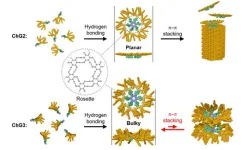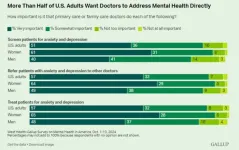(Press-News.org) COLUMBUS, Ohio – In a polarized nation, there is one thing that nearly all Americans agree on, according to a recent study: Sports are good for us.
Researchers from The Ohio State University and Ithaca College found that more than 9 out of 10 Americans agreed that sports build character and improved one’s health, while 84% agreed playing sports makes one popular in school and 85% said it makes one more well-known in the community.
According to 67% of those surveyed, playing sports even leads to better grades in school.
While these beliefs may seem harmless, they suggest that most Americans endorse what is called the “Great Sport Myth,” said Evan Davis, lead author of the study and assistant professor of sport management at Ithaca College.
“There are a lot of issues and problems in sports, but the Great Sport Myth glosses over them and says that sports are inherently good and pure,” Davis said.
Some youth who play sports face mistreatment including abuse and bullying, while even more experience burnout, unequal access to some sports and facilities, and other issues, said study co-author Chris Knoester, professor of sociology at Ohio State.
“The Great Sport Myth says that the positive results from sports are automatic – you just have to roll out the ball and good things are going to happen,” Knoester said. “That’s not true, but a large majority of Americans appear to buy into that.”
The study was published recently in the Journal of Sport and Social Issues.
It is true that sports can have many benefits for those who participate, the researchers said. The issue is to make sure that people don’t get so blinded by the good things about sports that they ignore the problems.
For example, previously published Ohio State research links youth sports participation with better mental health in adulthood. But the benefits were only apparent for those who continued to play sports throughout childhood. Most youth sports participants reported dropping out of sports and commonly said they did so because it was not fun, they were not a good enough player, they did not get along with the coach or teammates, they became injured, or they did not have enough money.
These findings underline that the benefits of sports depend on the situational contexts of them, including the presence of positive, healthy interactions and inclusive cultures, Knoester said.
The Great Sport Myth is a concept developed and introduced in 2015 by influential sport sociologist Jay Coakley, a professor emeritus at the University of Colorado-Colorado Springs.
The purpose of this new study was to use a large national survey to assess and analyze the extent to which U.S. adults endorse two essential components of the myth: the assumed personal development and social capital benefits of playing sports.
Survey data came from the National Sports and Society Survey (NSASS), sponsored by Ohio State’s Sports and Society Initiative.
The survey was completed by 3,993 adults who volunteered to participate through the American Population Panel, run by Ohio State’s Center for Human Resource Research. Participants, who came from all 50 states, answered the survey online between the fall of 2018 and spring of 2019.
Because NSASS participants are disproportionately female, white and college graduates, the researchers weighted the survey results to reflect the U.S. population more accurately.
The results showed that the majority of Americans thought sports helped people’s character, health, grades, popularity in school and recognition in the community.
But the findings also showed that various groups that people belonged to, their position in society and experiences with sports all played a role in how much they agreed with these key components of the Great Sport Myth.
The researchers found that Black Americans were more likely than white Americans to embrace aspects of the myth. That makes sense, Davis said.
“It seems as if, in the Black community, sports are often viewed in a positive light and have historically been seen as a unique way to get ahead in society,” he said.
Knoester said one particularly intriguing finding was that the more children a study participant had, the more likely he or she endorsed the elements of the Great Sport Myth.
“This might have to do with the extent that children really immerse parents in sports cultures, as they take their kids to soccer practices or other sports activities,” Knoester said.
“It seems to really encourage parents to believe in how good sports are for their children.”
Christians and conservatives were more likely to embrace the benefits of sports participation for personal development and gaining popularity in the community. Heterosexuals were more positive than those who identified as sexual minorities, and men were more positive than women and those who are nonbinary.
Not surprisingly, people who said they grew up in communities high in passion for sports and who became bigger sports fans and participants were also more likely to believe in aspects of the Great Sport Myth. But people who reported being mistreated in their sports interactions, such as being subject to cruel comments or more extreme forms of abuse, were less enthusiastic about the benefits of sports.
The researchers also analyzed how combinations of these different factors were linked to feelings about the value of sports.
Based on their answers to questions about family and community exposure to sport, immersions in sport cultures, and beliefs about the values of sports, Davis and Knoester compared those who had more negative involvement and low involvement in sports compared to those who had more positive and high involvement in sports.
Results showed an enormous difference – more than 70 percentage points – in the probability between these two groups that respondents would strongly agree that sports build character.
“It is the people who are most immersed in these sports cultures that have the greatest belief in elements of this myth,” Knoester said. “But they may also be less likely to be critical of the problems that are going on.”
Davis added: “What makes the Great Sport Myth a myth is that it’s become the preferred story about sport. If you ask people how they feel about sports, they immediately go to the positives but rarely consider the negatives.
The focus should be on the context of how sports are operating in each situation, Knoester added.
“Sports often do good things, but it is important to be critical and take the time to assess our sports environments to make sure we are really getting the best outcomes that sports can produce.”
END
Here’s something Americans agree on: Sports build character
Belief in the ‘Great Sport Myth’ may be problematic
2024-11-21
ELSE PRESS RELEASES FROM THIS DATE:
Engineering nature’s blueprint: Dendron-based assemblies for chlorophyll’s materials
2024-11-21
Researchers often look to photosynthesis—a process that turns sunlight into chemical energy in plants and bacteria—as a model for innovation. Photosynthesis is in turn linked to chlorophyll pigments, tiny green molecules that play a key role in harvesting light. Naturally, these chlorophyll molecules are organized into precise structures to optimize light absorption in plants and bacteria, and efficiently capture sunlight for energy. Inspired by this natural structure, scientists have explored ways to synthetically assemble chlorophyll-based ...
Study reveals how cell types shape human brain networks
2024-11-21
Rutgers researchers at the Brain Health Institute (BHI) and Center for Advanced Human Brain Imaging Research (CAHBIR) have uncovered how different types of brain cells work together to form large-scale functional networks in the human brain – interconnected systems that support everything from sensory processing to complex decision-making – paving the way for new insights into brain health and disease.
By pinpointing these cellular foundations, the study, published in Nature Neuroscience, offers a deeper understanding of the cellular foundations of cognition and mental health.
The brain’s functional properties arise from the varied ...
New genetic explanation for heart condition revealed
2024-11-21
A potentially life-changing heart condition, dilated cardiomyopathy, can be caused by the cumulative influence of hundreds or thousands of genes and not just by a single “aberrant” genetic variant, as was previously thought, finds a new study led by researchers at UCL (University College London), Imperial College London and the MRC Laboratory of Medical Sciences.
Dilated cardiomyopathy (DCM) is a condition in which the heart becomes progressively enlarged and weakened, reducing its ability to pump blood efficiently. It is estimated to affect up to 260,000 people in the UK (one in every 250 individuals) and is the leading cause of heart transplantation.
Previously, ...
Poor mental health linked to browsing negative content online
2024-11-21
People with poorer mental health are more prone to browsing negative content online, which further exacerbates their symptoms, finds a study led by UCL researchers.
The relationship between mental health and web-browsing is causal and bi-directional, according to the Wellcome-funded study published in Nature Human Behaviour.
The researchers have developed a plug-in tool* that adds ‘content labels’ to webpages—similar to nutrition labels on food—designed to help users make healthier and more informed decisions about the ...
People with migraine at high risk of depression during pandemic
2024-11-21
Toronto, ON – A recent longitudinal study from the University of Toronto reveals the mental health consequences of the COVID-19 pandemic on older adults living with migraine.
Using a sample of more than 2,000 older adults with migraine from the Canadian Longitudinal Study on Aging, researchers examined changes in depression status among this population during the pandemic. More than 1 in 7 older adults with migraine experienced depression for the first time during the COVID-19 pandemic, while approximately 1 in 2 with a previous history of depression experienced a recurrence during this period.
“People ...
Climate-driven hazards increases risk for millions of coastal residents, study finds
2024-11-21
A new study published in Nature Climate Change estimates that a 1-meter sea level rise by 2100 would affect over 14 million people and $1 trillion worth of property along the Southeast Atlantic coast, from Norfolk, Virginia, to Miami, Florida.
The study assesses the cumulative impact of multiple climate-driven coastal hazards, including sea level rise, flooding, beach erosion, sinking land, and rising groundwater, all of which are expected to worsen significantly by the end of the 21st century.
The scale of these interconnected ...
Females sleep less, awaken more frequently than males
2024-11-21
Females sleep less, wake up more often and get less restorative sleep than males, according to a new animal study by CU Boulder researchers.
The findings, published in the journal Scientific Reports, shed new light on what may underlie sleep differences in men and women and could have broad implications for biomedical research, which for decades has focused primarily on males.
“In humans, men and women exhibit distinct sleep patterns, often attributed to lifestyle factors and caregiving roles,” said senior author Rachel Rowe, assistant professor of integrative physiology. “Our results suggest that biological ...
Most Americans want primary care providers to address mental health
2024-11-21
WASHINGTON, D.C. — Nov. 21, 2024 — A majority of Americans (70%) say they would prefer to be asked about both their physical and mental health during medical appointments with their primary care providers (PCPs). The finding from the new West Health-Gallup Survey on Mental Health in America comes as more than one in five U.S. adults, or 59.3 million people, were living with a mental illness in 2022, and little more than half of them (50.6%) received treatment within the prior year.
According to the survey, majorities of men (65%) and women (76%) are eager to discuss both their mental and physical health with their primary ...
Millions of Americans hurt by others’ drinking, drug use: study
2024-11-21
by Amy Norton
PISCATAWAY, NJ – The risks of alcohol and other drug consumption to the user are well known, but many Americans--nearly 160 million--say they’ve been harmed by someone else’s substance use, according to a new study in the Journal of Studies on Alcohol and Drugs.
In a national survey of U.S. adults, researchers found that 34% said they’d ever suffered “secondhand harm” from someone else’s alcohol use--ranging from marriage and family problems to financial fall-out to being assaulted or injured in a drunk-driving accident. Meanwhile, 14% said they’d been harmed ...
Plasma-derived atomic hydrogen advances low-temperature CO2 methanation at high yield
2024-11-21
Plasma-derived atomic hydrogen (PDAH) enables low-temperature carbon dioxide methanation reaction through the Eley−Rideal-type reaction channel, improving methane yield at low temperatures, as shown by scientists at Science Tokyo. The findings underscore the potential of PDAH in advancing sustainable carbon dioxide recycling methods and optimizing other catalytic hydrogenation reactions, providing a promising avenue for improved efficiency in various energy and environmental technologies.
Despite declining reserves and significant carbon dioxide (CO2) emissions contributing to ...
LAST 30 PRESS RELEASES:
COVID-19 vaccination during pregnancy may help prevent preeclampsia
Menopausal hormone therapy not linked to increased risk of death
Chronic shortage of family doctors in England, reveals BMJ analysis
Booster jabs reduce the risks of COVID-19 deaths, study finds
Screening increases survival rate for stage IV breast cancer by 60%
ACC announces inaugural fellow for the Thad and Gerry Waites Rural Cardiovascular Research Fellowship
University of Oklahoma researchers develop durable hybrid materials for faster radiation detection
Medicaid disenrollment spikes at age 19, study finds
Turning agricultural waste into advanced materials: Review highlights how torrefaction could power a sustainable carbon future
New study warns emerging pollutants in livestock and aquaculture waste may threaten ecosystems and public health
Integrated rice–aquatic farming systems may hold the key to smarter nitrogen use and lower agricultural emissions
Hope for global banana farming in genetic discovery
Mirror image pheromones help beetles swipe right
Prenatal lead exposure related to worse cognitive function in adults
Research alert: Understanding substance use across the full spectrum of sexual identity
Pekingese, Shih Tzu and Staffordshire Bull Terrier among twelve dog breeds at risk of serious breathing condition
Selected dog breeds with most breathing trouble identified in new study
Interplay of class and gender may influence social judgments differently between cultures
Pollen counts can be predicted by machine learning models using meteorological data with more than 80% accuracy even a week ahead, for both grass and birch tree pollen, which could be key in effective
Rewriting our understanding of early hominin dispersal to Eurasia
Rising simultaneous wildfire risk compromises international firefighting efforts
Honey bee "dance floors" can be accurately located with a new method, mapping where in the hive forager bees perform waggle dances to signal the location of pollen and nectar for their nestmates
Exercise and nutritional drinks can reduce the need for care in dementia
Michelson Medical Research Foundation awards $750,000 to rising immunology leaders
SfN announces Early Career Policy Ambassadors Class of 2026
Spiritual practices strongly associated with reduced risk for hazardous alcohol and drug use
Novel vaccine protects against C. diff disease and recurrence
An “electrical” circadian clock balances growth between shoots and roots
Largest study of rare skin cancer in Mexican patients shows its more complex than previously thought
Colonists dredged away Sydney’s natural oyster reefs. Now science knows how best to restore them.
[Press-News.org] Here’s something Americans agree on: Sports build characterBelief in the ‘Great Sport Myth’ may be problematic




